
Guests
- Mahmoud AlsaqqaOxfam’s emergency food security and livelihoods lead in Gaza.
As Gazans face mass starvation due to Israel’s blockade, more than 100 humanitarian organizations are demanding action to end Israel’s siege of Gaza. Their warning comes as the Palestinian Ministry of Health announced the number of starvation-related deaths in Gaza has climbed to at least 113 people. We go to Gaza City for an update from Mahmoud Alsaqqa, Oxfam’s emergency food security and livelihoods lead. “We are really exhausted, and we’ve become unable to bear the situation any longer,” says Alsaqqa, who adds he has lost nearly 15 pounds since the Israeli blockade began.
Transcript
NERMEEN SHAIKH: We begin today’s show in Gaza, where health officials have reported two more deaths, quote, “due to famine and malnutrition” in the past 24 hours. They say at least 113 Palestinians have starved to death. The World Health Organization is warning Gaza is suffering from man-made mass starvation caused by Israel’s blockade. The WHO’s Director-General Tedros Ghebreyesus spoke on Wednesday.
TEDROS ADHANOM GHEBREYESUS: As you know, mass starvation means starvation of a large proportion of a population. And a large proportion of the population of Gaza is starving. I don’t know what you would call it, other than mass starvation. And it’s man-made, and that’s very clear. And this is because of blockade, and, I have said it in my statement, more than 80 days of blockade straight. And then, of course, there is opening now, but it’s not enough. It’s just a trickle, and people are starving.
NERMEEN SHAIKH: At this point, Gaza officials say 500,000 bags of flour are needed each week to, quote, “avoid a comprehensive humanitarian collapse.” Doctors Without Borders, Save the Children and Oxfam, along with over a hundred other aid agencies, issued a statement saying their staff and the people they serve in Gaza were, quote, “wasting away.” Doctors and medical staff in Gaza told The Guardian that the lack of food has left them too weak and depleted their physical health, making it difficult to provide urgent medical care for their suffering patients.
In Khan Younis, one mother, Najah Barbakh, talked about the plight of her malnourished daughter.
NAJAH BARBAKH: [translated] Since I delivered her, she has been small, and she doesn’t grow up. Her condition gets worse in the hospital. And every time I go home, I find her becoming more and more weak. Her nerves are weak, and she doesn’t sit properly. Babies like her, in her age of 11 months, should sit up straight. She should be 11 or 10 kilograms minimum. My daughter can’t sit straight or play with her siblings. She stays lying on her back, and that’s all.
AMY GOODMAN: This comes as Israeli President Isaac Herzog visited soldiers in Gaza on Wednesday to show support, and said intensive negotiations for a ceasefire are underway.
PRESIDENT ISAAC HERZOG: [translated] We owe you our thanks. You are holding the line for us here. I would say, for an entire country, a small number of people are carrying this immense, tremendous campaign.
AMY GOODMAN: For more, we go to Gaza City, where we’re joined by Mahmoud Alsaqqa, Oxfam’s emergency food security and livelihoods lead in Gaza.
Welcome to Democracy Now! You are right there in Gaza City. Can you describe what’s happening on the ground? The U.N.'s World Food Programme said earlier this week nearly a third of Gaza's population was not eating for several days at a time.
MAHMOUD ALSAQQA: Yeah. Thank you, DN, for having me again in this show.
In fact, it’s become not easy even for us to describe the situation on the ground that we are all living. We are seeing this starvation is widespread nowadays, and increasingly widespread. And we are seeing that the human death become an absolute, and we are seeing that more than 100 people have lost their lives until now because of that.
Unfortunately, this is happening in front of all of all the world, while the world, all the world, are watching this heartbreaking and without having a concrete action. And this is really harmful and also confused us as a people who are living here and working there, and how all this is happening in front of the world and without having — without having concrete actions.
We were, past — in the past, we are saying that the vulnerable groups in the Gaza are threatened by malnutrition and starvation, but nowadays we are talking about the whole populations are suffering from starvation and also diseases. We have just released in a report that showed a lot of people and how the Gazan people are facing multiple kind of disease, mainly waterborne diseases, and this kind of diseases could be preventable and treated easily if we have our supplies and the medical supplies in. This is the situation on the ground, to be honest. It is unbearable. And it’s not easy even for us to describe what’s happening.
And what is astonishing us and also confusing us again: How is all this happening without having any real and concrete actions? We are in 2025, and we are seeing the scenes on the TV shows that people are starving to death on a daily basis. And we are expecting the worst is coming, and we’re still lacking this concrete actions and decisive action from the people who have this pressure on Israel in that regard. It’s shameful that Israel has been allowed to besiege Gaza all this period of time, even before for the last five months. So, that’s the reality on the ground.
NERMEEN SHAIKH: Mahmoud, as you pointed out, now everyone working in Gaza is impacted, including medical personnel, journalists and, of course, people working at Oxfam and other aid agencies operating in Gaza. There are reports of medical staff fainting in operating rooms during surgeries. There have been statements. Your statement, the Oxfam statement that was issued along with over a hundred other aid agencies, has said that “With supplies now totally depleted, humanitarian organizations are witnessing their own colleagues and partners waste away before their eyes.” One agency representative quoted in the letter says — in the statement, “Each morning, the same question echoes [across] Gaza: will I eat today?” So, Mahmoud, if you could talk about your own experience, the experience of your colleagues at Oxfam and their families?
MAHMOUD ALSAQQA: To be honest, in that situations, we are seeing ourselves and our colleagues on a daily basis becoming more weak and weak. And to be honest, we are — we are more, let’s say, privileged that we still have our work in that regard. But as you already mentioned, we have a depleted market. Even if you have money, it’s not easy for you to find something to eat. So, this is the question and the uncertainty on a daily basis for each of the people here in Gaza about: Are they going to eat today or not? And it’s become frustrating and become — become really harmful for us, even we are supposed to help the people. And we have — you know, it’s compounded even — you can imagine, for us, we are facing and enduring that right now. You can imagine the vulnerable groups who are — what they are facing right now. It’s compounded suffering for them. We are talking about the elderly people, the women and the children in that regard. So, this is the issue.
And the issue that we have released this joint statement, that we have our supplies outside Gaza. We have thousands of tons of supplies that could resolve this issue, but we are not allowed even to get it in and to support the people and to fulfill our mandate in supporting the people who are in desperate need.
And in the same times, we are seeing massacres on a daily basis at the distribution point for this militarized mechanisms, and the people are losing their lives. More than 1,000 people are losing their lives in this distribution points, and other thousands of people have been injured in that regard.
The solution is clear and straightforward, if we are allowed to work, as we used to work even during the war, in supporting the people and supporting ourselves and our colleagues in maintaining our daily lives, I think they are at least — needs this opportunity to rebuild and to recover from all this what’s happening. And this is possible, in case of releasing all this shameful and illegal besiege and blockade.
AMY GOODMAN: Have you lost weight, Mahmoud?
MAHMOUD ALSAQQA: Sorry?
AMY GOODMAN: Have you lost weight?
MAHMOUD ALSAQQA: Yeah, myself, I think at least I have lost about 12 to 15 kilograms during the last at least five months. But, you know, I’m even in a better case than many other people in our community, in our — that we are observing and dealing with on a daily basis. The situation is more worse than the words that I’m describing the situation in.
AMY GOODMAN: I wanted to continue reading from that letter of the hundred humanitarian groups that Nermeen started. The statement also quotes an aid worker providing psychosocial support, who said, quote, “Children tell their parents they want to go to heaven, because at least heaven has food.” And the letter ends, “States can and must save lives before there are none left to save.”
MAHMOUD ALSAQQA: You can imagine how much pressure such words could drop on their parents in that regards. And unfortunately, we have just seen some of the posts in the social media. You can imagine what the parents are writing on the social media. And they are thanking God for the loss of their children who have been killed in a certain time of the war because of the bombardment or the invasion. They are thanking God that they have lost their children to not reach to this stage, while their children are asking them to feed them, and they didn’t have any capacity and any ways to just fulfill the needs of their children. So, this is beyond description and even unimaginable, to be honest.
NERMEEN SHAIKH: You know, a recent — Mahmoud, an Oxfam article talked also about the shortage of fuel, that Israeli authorities have denied humanitarian workers the permission to collect fuel stored in a U.N. warehouse inside Gaza. What’s been the impact of that?
MAHMOUD ALSAQQA: You know, it’s directly impacting our two very critical sectors. We are talking about the water and sanitation, and the bombing of the water, and also the health, the health facilities and the health centers. And on a daily basis, there are a lot of statements about the traumatic situation of our healthcare centers. And this is why we are seeing now the spread of the diseases, that it’s linked to the waterborne diseases. And you are talking about increase in percentages, increasing 100%, 200%, 300%, such as in a watery area or the bloodied area, and other diseases that could be prevented. And the same issue with the health facilities, and this is risking the lives of the people inside these facilities because of this lack of fuel.
So, it’s all linked together with the complications that without having concrete action in that regards, this will continue. And unfortunately, every day without having this ceasefire, we are — more deaths are happening, and more people are losing their lives. So, it’s not about days or months; we are talking on a daily basis we have people losing their lives because of diseases and starvation. So, I think there is no much needed action than now.
NERMEEN SHAIKH: So, Mahmoud, just before we end, if you could say: What do you think the prospects of a ceasefire are now? In Tel Aviv, there were protests, thousands of antiwar protesters calling for a ceasefire. So, perhaps there’s a change in sentiment in Israel itself. And then, Trump’s envoy, Steve Witkoff, Middle East envoy, is now meeting with Israeli and Qatari officials to work towards a ceasefire. What’s your sense?
MAHMOUD ALSAQQA: Before my sense, you cannot imagine how the people here in Gaza are approaching such details. And unfortunately, they have been disappointed many times because of not reaching such a ceasefire. We are aiming that this time it could happen, because the people are really exhausted. We are really exhausted, and we’ve become unable to bear the situations longer. And there is lives that is counted on a daily basis and lost. So, all the people here in Gaza are aiming and willing and also looking for the time of such a ceasefire could be announced, so they can at least to finally begin to breathe again, to recover and to rebuild and to have this entry complete. And the people are even looking for this permanent ceasefire nowadays, and not just a pause, because they are looking for a full, complete ceasefire, where they can get all the supplies in, and they can — as I said, they can at least recover and breathe again.
AMY GOODMAN: Mahmoud, we want to thank you for being with us. Mahmoud Alsaqqa is Oxfam’s emergency food security and livelihoods lead, speaking to us from Gaza City.
Next up, we go to journalist Afeef Nessouli, just back from reporting in Gaza for seven weeks while he volunteered as an aid worker for a medical nonprofit and reported in his off hours, documenting how many community kitchens have no more food. Stay with us.
[break]
AMY GOODMAN: “Wildegeeses” by the late folk singer Michael Hurley, performing in our Democracy Now! studio.

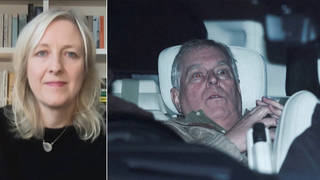
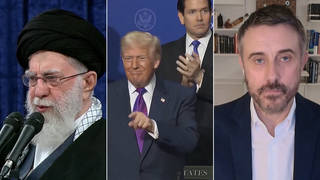
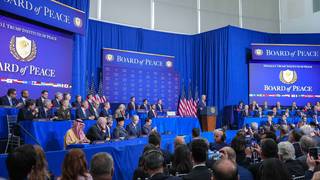
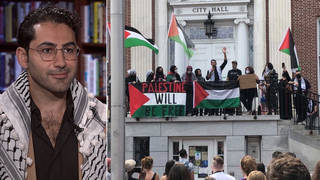





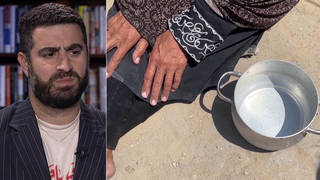


Media Options